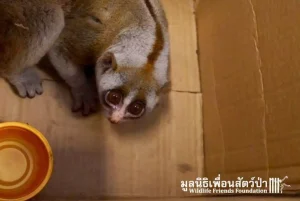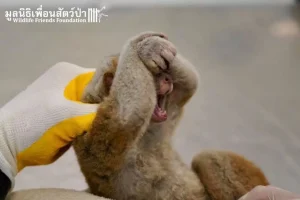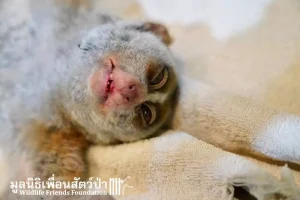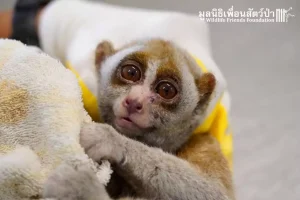He was lost in a big city — and no one knows how he got there.
Earlier this month in Bangkok, Thailand, a Good Samaritan wandered across a tiny, nocturnal animal who usually never sees the light of day: a Bengal slow loris.

These uncommon creatures, famed for their startlingly big eyes, are sometimes kept as pets in Thailand but this sluggish loris managed to escape and end up on the streets. When they discovered him, they knew exactly what to do and took him to the Wildlife Friends Foundation of Thailand (WFFT).

The sanctuary takes in slow lorises with clipped teeth quite often, which is done as a precaution so the loris can’t bite their human owners.
Even though they’re adorable, slow lorises can be deadly. They can inflict a painful, venomous bite with their sharp teeth — so many sold as pets have had their teeth clipped.
Surprisingly, this little loris only had one of his teeth clipped.

“We have no idea why only one tooth was clipped in this case and how he came to be free in the city but he has had surgery to remove the infected root fragment and is responding well to treatment,” the WFFT team said in an update.
Since recovering from surgery, the loris was named Donald and is living a much more natural life at the sanctuary. Because slow lorises are naturally nocturnal, their large, lamp-like eyes are very sensitive to the sun, which is just one of the many reasons why the WFFT team highly discourages keeping them as pets.
“They may look cute in photos with their massive eyes, but those eyes are designed to see in the dark and are damaged when exposed to bright sunshine,” Donald’s caretakers said.

Because of the skilled treatment Donald has gotten at the sanctuary, his chances of being released in the wild are looking very good. Donald is becoming stronger every day.
Caretakers for the loris remarked, “We may never know what happened to [this] specific loris to be found in such an unusual environment, but we can assure his future will be a bit nicer to him.” We hope to see him returned to the wild, where his species is facing a dire decline.
0 Comments